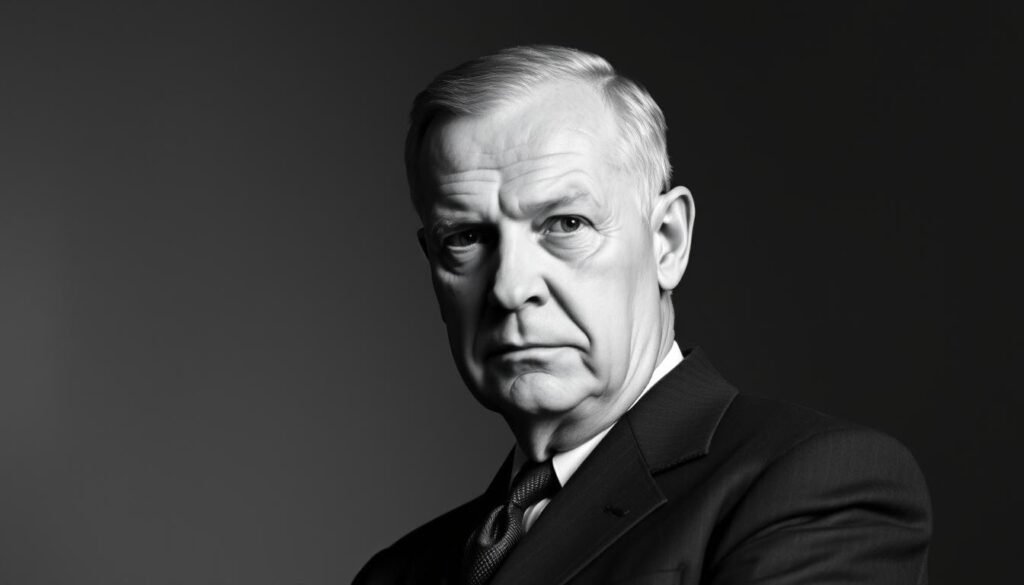Why Was Eisenhower a Good President? Have you ever thought about the 34th President of the United States, Dwight D. Eisenhower? He made a big difference during his time in office. His leadership and policies brought about important changes.
Eisenhower’s time as president was filled with big accomplishments. His leadership and character helped shape the country’s future. His presidency was a time of growth and development.
He focused a lot on improving the country’s infrastructure. He also had a strong approach to foreign policy. Learning more about these areas can help you see how his presidency had a lasting impact.
Contents
- 1 Eisenhower’s Path to the Presidency
- 2 Domestic Policy Achievements
- 3 Foreign Policy Successes
- 4 Leadership Style and Character
- 5 Why Was Eisenhower a Good President: Historical Assessment
- 6 Conclusion: Why Was Eisenhower a Good President?
- 7 FAQ
- 7.1 What were Eisenhower’s major domestic policy achievements?
- 7.2 What was the “Atoms for Peace” program?
- 7.3 How did Eisenhower’s military background influence his presidency?
- 7.4 What is Eisenhower’s historical ranking among U.S. Presidents?
- 7.5 How did Eisenhower handle crises during his presidency?
- 7.6 What were the key aspects of Eisenhower’s leadership style?
- 7.7 What was the significance of Eisenhower’s balanced budget approach?
Eisenhower’s Path to the Presidency
Eisenhower’s journey to the White House began with his role as Supreme Commander of the Allied Forces in World War II. His leadership and strategic mind were key to the Allied victory. This earned him great respect and recognition.
Eisenhower was born in Denison, Texas, in 1890. He grew up in a humble home in Kansas. He graduated from West Point in 1915.
His military career spanned both World War I and World War II. Though he didn’t fight in World War I, his leadership in World War II was crucial.
His experience as Supreme Commander made him a top contender for the presidency. Below is a table showing important moments in his presidential journey.
| Year | Event | Significance |
|---|---|---|
| 1890 | Born in Denison, Texas | Early life |
| 1915 | Graduated from West Point | Entry into military career |
| 1944 | Appointed Supreme Commander of the Allied Forces | Leadership in World War II |
| 1952 | Elected as President of the United States | Beginning of presidency |
Eisenhower’s legacy as a military leader and statesman paved the way for his presidency. His presidency was marked by many achievements in domestic and foreign policy. Knowing his path to the presidency helps us understand his decisions and policies.
Domestic Policy Achievements
Eisenhower’s domestic policy was marked by key achievements. These helped stabilize and grow the U.S. economy. He focused on a balanced budget approach and made changes in taxes and social security.
Balanced Budget Approach
Eisenhower pushed for a balanced budget. This showed his dedication to good finances. He wanted to cut the national debt and keep the economy stable.
His team also worked on tax and social security reforms. These changes aimed to make the economy fairer and more secure for Americans.
| Policy | Description | Impact |
|---|---|---|
| Balanced Budget | Ensured government expenditures did not exceed revenues | Reduced national debt, promoted economic stability |
| Tax Reforms | Adjusted tax rates to promote economic equity | Stimulated economic growth, reduced inequality |
| Social Security Reforms | Expanded social security benefits | Enhanced financial security for citizens |
Eisenhower’s domestic policies had a big impact on the U.S. economy. His balanced budget and reforms in taxes and social security helped a lot. These efforts showed his commitment to a strong economy and fairness for all.
Foreign Policy Successes
Eisenhower’s foreign policy was a blend of military might and diplomacy. This mix led to many successes. You will see how he handled the Cold War and his lasting influence on world politics.
The “Atoms for Peace” program was a key part of Eisenhower’s policy. It aimed to use nuclear energy for peace and reduce nuclear war threats. The U.S. shared nuclear tech with other countries, showing its commitment to peaceful use.
The “Atoms for Peace” Program
The “Atoms for Peace” program changed nuclear tech’s focus from war to peace. Eisenhower’s team wanted to ease nuclear worries and boost global nuclear energy cooperation.
Here’s a table showing Eisenhower’s foreign policy highlights:
| Initiative | Objective | Outcome |
|---|---|---|
| Atoms for Peace | Promote peaceful nuclear energy | Increased international cooperation on nuclear technology |
| Cold War Diplomacy | Manage tensions with the Soviet Union | Avoidance of direct conflict; establishment of diplomatic channels |
| International Relations | Foster global stability | Strengthened alliances and promoted economic development |
Eisenhower’s success wasn’t just in the “Atoms for Peace” program. His Cold War diplomacy and efforts for global stability showed a deep understanding of international relations.
Looking at Eisenhower’s foreign policy achievements, we learn about his presidency’s complexities. His initiatives still shape global security and cooperation today.
Leadership Style and Character
Eisenhower was great at handling crises. His calm and careful decision-making was key during his presidency.

Eisenhower stayed calm in tough times. This helped him make smart choices without letting emotions get in the way. His leadership was based on honesty, integrity, and a strong sense of duty.
Crisis Management Skills
Eisenhower was excellent at managing crises. For example, during the Suez Crisis, he was firm but diplomatic. He showed he could handle complex international issues well.
His crisis management involved careful planning and talking to advisors. He was also ready to act decisively when needed.
| Leadership Trait | Description | Example |
|---|---|---|
| Calm Decision-Making | Ability to remain composed under pressure | Suez Crisis |
| Integrity | Strong moral principles guiding his actions | Handling of the U-2 Spy Plane Incident |
| Decisiveness | Willingness to take action when necessary | Decision to send troops to Little Rock |
In conclusion, Eisenhower’s leadership was crucial to his success. His crisis management skills, integrity, and decisiveness won him respect from many.
Why Was Eisenhower a Good President: Historical Assessment
Looking back at Eisenhower’s time in office, it’s clear his choices shaped the country. His leadership during the Cold War and his domestic policies have been studied a lot.
Eisenhower’s way of leading was a blend of old and new ideas. He focused on building the country’s roads, creating the Interstate Highway System. This big project changed how America moved around.
Many historians say Eisenhower was among the best U.S. presidents. His lasting impact includes:
- Managing the economy well
- Making smart foreign policy choices
- Building important roads and highways
Studies on Eisenhower’s presidency highlight his skill in handling tough situations. His influence on future leaders shows how his decisions still matter today.
People keep learning about Eisenhower’s legacy, finding new insights into his presidency. Yet, his reputation as a highly respected president remains strong.
Conclusion: Why Was Eisenhower a Good President?
Eisenhower’s presidency was filled with important achievements. His leadership and character greatly influenced his decisions. This made him a respected figure in American history.
He worked on big projects like the interstate highway system and expanded social security. These efforts had a lasting impact on the country. His success in the Cold War also boosted his reputation as a skilled leader.
To understand why Eisenhower was a good president, we must see his balance of leadership and diplomacy. His presidency shows that vision, integrity, and pragmatism can lead to great achievements.
Eisenhower’s legacy still influences today’s leaders. It shows why he is considered one of America’s most effective presidents.
See Also: Uncovering the Reasons Behind Roosevelt’s War Analogy
FAQ
What were Eisenhower’s major domestic policy achievements?
Eisenhower focused on balancing the budget. He also made big changes in taxes and social security. These efforts helped the economy grow and stay stable.
What was the “Atoms for Peace” program?
The “Atoms for Peace” program was a key part of Eisenhower’s foreign policy. It aimed to use nuclear energy for peace and lower the risk of nuclear war.
How did Eisenhower’s military background influence his presidency?
Eisenhower’s time as Supreme Commander in World War II shaped his leadership. It helped him make strong decisions on national security and foreign policy.
What is Eisenhower’s historical ranking among U.S. Presidents?
Historians and scholars often rank Eisenhower among the best U.S. Presidents. They praise his leadership, domestic achievements, and foreign policy efforts.
How did Eisenhower handle crises during his presidency?
Eisenhower was great at managing crises. He made calm and thoughtful decisions, showing his leadership skills.
What were the key aspects of Eisenhower’s leadership style?
Eisenhower’s leadership was marked by crisis management and fiscal responsibility. He also worked to make the economy fairer through tax and social security reforms.
What was the significance of Eisenhower’s balanced budget approach?
Eisenhower’s balanced budget showed his dedication to financial responsibility. It helped keep the economy stable and encouraged growth.

Hi, I am Tatum Bradford from Washington. I have a background in political science and work as a senior revenue officer. I love learning about U.S. presidents and sharing interesting facts about political history.

